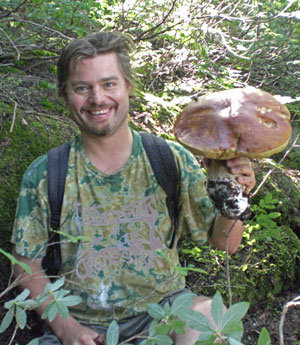Editor's note: Daniel Winkler, a German ecologist, has researched caterpillar fungus and its economic effects on China for 15 years. A study he conducted in 2005 with Losang Dradul of the China Tibetology Research Center motivated authorities in the Tibet autonomous region to introduce a licensing system for fungus harvesting and to keep track of the yearly output.
Over-harvesting and poor statistical tracking of caterpillar fungus are major challenges for the sustainable management of the medicinal resource.
|
 |
|
German ecologist Daniel Winkler holding a porcini mushroom in 2007. PROVIDED TO CHINA DAILY |
Many rural Tibetans rely on this fungus for their incomes, and if anything happens to it, they will face big problems.
Collectors should realize old, low-value caterpillar fungus is better off left in the ground to spread spores for the next year. But at the moment, hundreds of thousands of people are going into the mountains to collect as much as they can. They can't find everything, but not much is left, and if the situation remains unchecked, the resource will be depleted sooner or later.
Authorities should shorten the harvest season and further limit the number of collectors — for example, only two members should come from each household.
If these restrictions are to work, the key is education. Officials need to work with community leaders to raise awareness to protect the resource so they can benefit for many years to come.
I visited Tibetan communities with collection rights in Yushu prefecture, Qinghai province, with representatives from the China branch of the World Wildlife Fund for Nature. I showed images to villagers to explain the fruiting stages of caterpillar fungus and the different market values.
It only took a few minutes to convince them that the mushroom needs spores to reproduce, contrary to local belief that it just grows by itself every year.
Policymakers should regulate the market to put people off old, low-value caterpillar fungus, which shrinks substantially after it's dried. Then collectors will have the incentive to give up collecting it.
The price rose by 900 percent between 1998 and 2008, when it then dropped 20 percent due to the financial crisis. The rise in price over the past four years is not as high as before, but harvests have fluctuated, as abundant production depends on sufficient rain and snowfall.
There are several research institutes in China devoted to genetic studies and artificial cultivation of caterpillar fungus, which is good news for Tibetan collectors who face serious competition and a price collapse.
However, more resources should be used to find out how to manage the collection of a natural product in a sustainable way, rather than learn how to cultivate artificial ones.
Daniel Winkler was talking to Li Yao and Daqiong.
